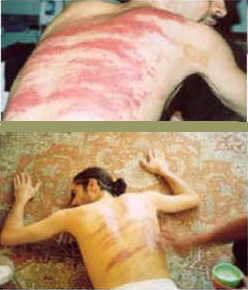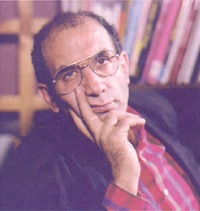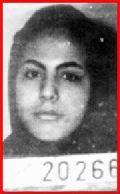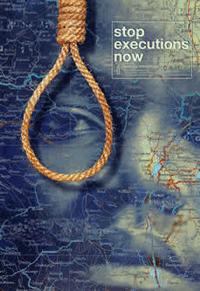Friday, August 19, 2005
Sunday, November 21, 2004
Tuesday, November 16, 2004

Reza Alijani
Reporters without Borders. Taghi Rahmani, of the weekly Omid-e Zangan, Hoda Saber, of Iran-e farda, and Reza Alijani, Iran-e farda's editor and winner of the Reporters Without Borders - Fondation de France Prize in 2001, who had been given heavy jail sentences in May but not arrested, were detained on 14 June and accused of having secret meetings with students who had staged anti-regime demonstrations that month. They were arrested on the orders of Judge Mortazavi.
See http://www.rsf.org/article.php3?id_article=9940


Hoda Saber
Reporters without Borders. Taghi Rahmani, of the weekly Omid-e Zangan, Hoda Saber, of Iran-e farda, and Reza Alijani, Iran-e farda's editor and winner of the Reporters Without Borders - Fondation de France Prize in 2001, who had been given heavy jail sentences in May but not arrested, were detained on 14 June and accused of having secret meetings with students who had staged anti-regime demonstrations that month. They were arrested on the orders of Judge Mortazavi.
See http://www.rsf.org/article.php3?id_article=9940


Taghi Rahmani
Reporters without Borders. Taghi Rahmani, of the weekly Omid-e Zangan, Hoda Saber, of Iran-e farda, and Reza Alijani, Iran-e farda's editor and winner of the Reporters Without Borders - Fondation de France Prize in 2001, who had been given heavy jail sentences in May but not arrested, were detained on 14 June and accused of having secret meetings with students who had staged anti-regime demonstrations that month. They were arrested on the orders of Judge Mortazavi.
See http://www.rsf.org/article.php3?id_article=9940

Sunday, November 14, 2004
Saturday, November 13, 2004

Amnesty International considers the punishment of flogging to constitute cruel, inhuman and degrading treatment amounting to torture, in contravention of the International Covenant on Civil and Political Rights (ICCPR) to which Iran is a state party. See http://web.amnesty.org/library/index/ENGMDE130082004?open&of=ENG-IRN


Amnesty International. Dariyush Foruhar, a prominent critic of the Iranian government, and his wife, Parvaneh Foruhar, were killed at their home in Tehran on 22 November. Dariyush Foruhar, Minister of Labour in the Provisional Government of Mehdi Bazargan in 1979, was the leader of the Iran Nation Party (Hezb-e Mellat-e Iran), a banned opposition group. Parvaneh Foruhar was also a prominent opposition activist. See http://web.amnesty.org/library/Index/engMDE130251998


Amnesty International. Dariyush Foruhar, a prominent critic of the Iranian government, and his wife, Parvaneh Foruhar, were killed at their home in Tehran on 22 November. Dariyush Foruhar, Minister of Labour in the Provisional Government of Mehdi Bazargan in 1979, was the leader of the Iran Nation Party (Hezb-e Mellat-e Iran), a banned opposition group. Parvaneh Foruhar was also a prominent opposition activist. See http://web.amnesty.org/library/Index/engMDE130251998

Friday, November 12, 2004

Zahra Kazemi, who had dual Canadian and Iranian nationality, died at the Baghiyetollah Hospital in Tehran while under guard. She was arrested for taking photographs of people protesting against the detention of family members outside the Evin prison in northern Tehran. Amnesty International has documented for years cases of ill-treatment and torture in detention. See http://web.amnesty.org/library/index/engmde130222003


Amnesty International: Mohammad Mokhtari, another writer questioned over the establishment of Kanun, was found dead in suspicious circumstances on 9 December 1998 after having been missing for six days. Marks on his head and neck suggest he may have been beaten and strangled. See http://web.amnesty.org/library/Index/engMDE130251998?OpenDocument&of=COUNTRIES%5CIRAN

Thursday, November 11, 2004

Amnesty International outraged at reported execution of a 16 year old girl. The execution of Ateqeh Rajabi is the tenth execution of a child offender in Iran recorded by Amnesty International since 1990. Amnesty International has urged Iran’s judicial authorities to halt further executions of child offenders - people who were under 18 years old at the time of the offence. This is to bring Iran’s law and practice in line with requirements of international human rights law.
http://web.amnesty.org/library/index/engmde130362004


Amnesty International: At least 108 executions were carried out, including of long-term political prisoners and frequently in public. At least four prisoners were sentenced to death by stoning while at least 197 people were sentenced to be flogged and 11 were sentenced to amputation of fingers and limbs. The true numbers may have been considerably higher. See http://www.irantestimony.com/Docs/Report/AI/2004.htm




